China Brands, Marketing & Consumers
“Support Xinjiang MianHua!” – China’s Social Media Storm over Xinjiang Cotton Ban
The hashtag “Wo Zhichi Xinjiang Mianhua” – “I Support Xinjiang Cotton” – received over 6 billion views on Weibo.
Published
4 years agoon
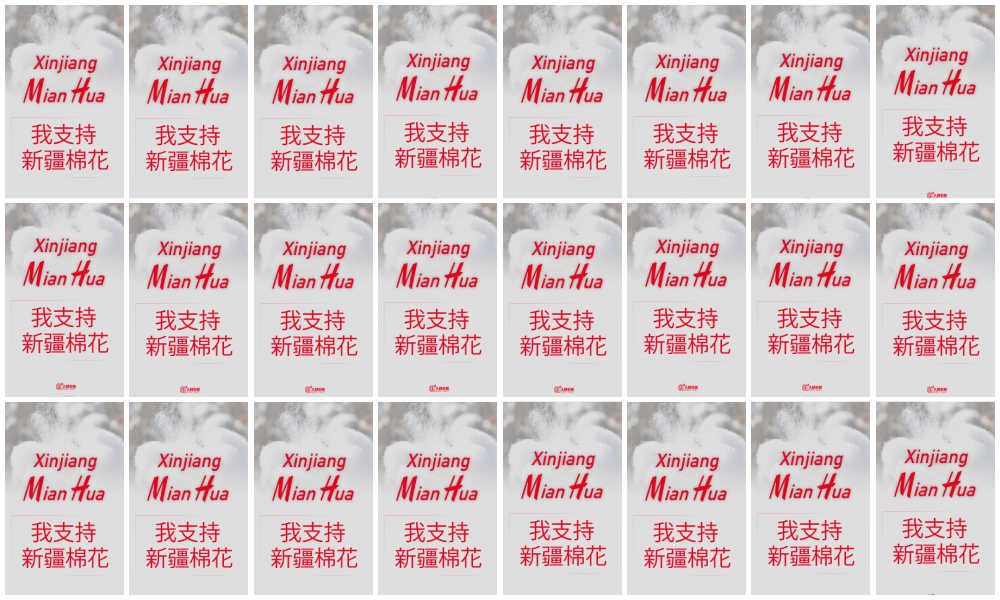
Western brands faced heavy criticism in China this week when a social media storm erupted over the Better Cotton Initiative (BCI) and its brand members for no longer sourcing from China’s Xinjiang region. The ‘Xinjiang cotton ban’ led to a major ‘Xinjiang cotton support’ campaign on Weibo, and a boycott for those brands siding with BCI.
In 2019, an extensive brand ‘witch hunt’ took place on Weibo and other Chinese social media networks in light of the protests in Hong Kong, with international fashion and luxury brands, from Versace to Swarovski, getting caught in the crossfire for listing Hong Kong, Macau, and Taiwan as separate countries or regions – not part of China – on their official websites or brand T-shirts.
Now, another brand ‘witch hunt’ is taking place on Chinese social media. This time, it is not about Hong Kong, but about Xinjiang and its cotton industry.
H&M, Uniqlo, Nike, Adidas and other international brands have caused public outrage for the stand they’ve taken against the alleged use of forced labor involving the Muslim Uyghur minority to produce cotton in China’s western region of Xinjiang.
The social media storm started earlier this week on Wednesday, March 24, and is linked to H&M and the ‘BCI’ (Better Cotton Initiative), a Swiss NGO that aims to promote better standards in cotton farming.
In October 2020, H&M shared a statement on its site in which the Swedish retailer said it was “deeply concerned” over reports of forced labor in the production of cotton in Xinjiang, officially Xinjiang Uygur Autonomous Region (XUAR).
H&M stated that it would no longer source cotton from Xinjiang, following the BCI decision to suspend licensing of BCI cotton in the region.
BCI and its Suspension of Activities in Xinjiang
The Better Cotton Initiative (BCI) is the largest cotton sustainability program in the world. It practices across 23 countries and accounts for 22% of global cotton production. The governance group was established in 2005 in cooperation with WWF and leading retailers, with the aim of promoting the widespread use of improved farm practices.

While H&M is a ‘top member’ of the Better Cotton Initiative (link), many others brands such as IKEA, Gap, Adidas, Nike, Levi’s, and C&A are also brand members.
January 2020
In January of 2020, the BCI was slammed by Dr Adrian Zenz, a senior fellow with the Victims of Communism Memorial Foundation in Washington DC, for its refusal to pull out of the Xinjiang region. At the time, 20 percent of its ‘better cotton’ was sourced from Xinjiang, which is China’s largest cotton growing area.
According to a 2020 report by EcoTextile, the BCI maintained that its implicated council member, the yarn producer Huafu, denied the allegations and that an independent audit of the company’s Aksu facility in Xinjiang had failed to identify any instances of forced labor. An earlier report by Adidas from 2019 also stated that their independent investigations found no evidence of forced labor.
March 2020
In late March of 2020, the BCI reportedly did suspend activities with licensed farmers in the Xinjiang region for the 2020/21 cotton season while also contracting a global expert to conduct an external review of the Xinjiang situation. Chinese state media Global Times later reported that despite suspending its licensing activities, the BCI would remain committed to cotton farming communities in Xinjiang and would continue to engage in activities in the region.
July 2020
The pressure on BCI and other brands to stop sourcing from Xinjiang was heightened when a coalition of civil society groups raised concerns over the treatment of the Uyghur Muslim minority in China and the “grave risk of forced labor.” Reuters reported that more than 180 organizations urged brands from Adidas to Amazon to end sourcing of cotton and clothing from the region and cut ties with any suppliers in China that would benefit from the alleged forced labour of Uyghur other Muslim groups.
October 2020
In October of 2020, the Better Cotton Initiative announced it would cease all field-level activities in Xinjiang with immediate effect because the region had reportedly become “an increasingly untenable operating environment.” The aforementioned statement by H&M came out in the same month.
March 2021
By late March 2021, various Chinese state media reported on the BCI suspension. These reports came days after a coordinated effort by the United States, the European Union, Britain and Canada to impose sanctions on Chinese officials over China’s alleged human rights violations and abuses in Xinjiang, something which was called a “concerted effort to slander China’s policies in its Xinjiang region” by Global Times. The news outlet linked these “anti-China forces’ efforts” to the BCI decision to suspend its Xinjiang activities.
A Social Media Storm over Xinjiang Cotton
The news developments were followed by a wave of social media boycott movements and Chinese brand ambassadors cutting ties with international brands, with H&M being the main target over its Xinjiang statement.
Chinese e-commerce platforms Taobao, JD.com, Pinduoduo, Suning.com, and Meituan’s Dianping on Thursday all removed H&M from their platforms, with Chinese Android app stores also removing H&M. On Thursday, a search for “H&M” came up with no results on these sites (see images below).
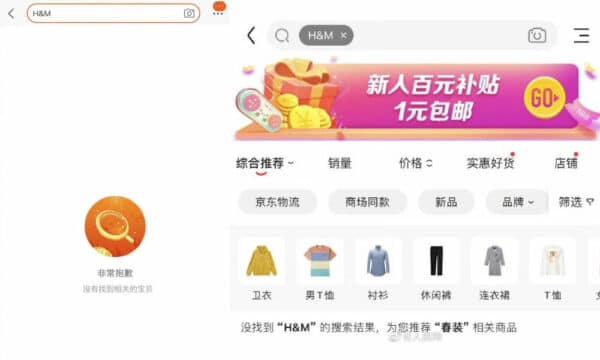
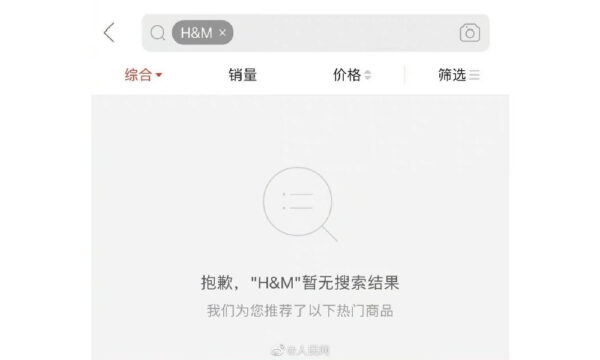
Two of China’s largest online maps also removed H&M from its systems.
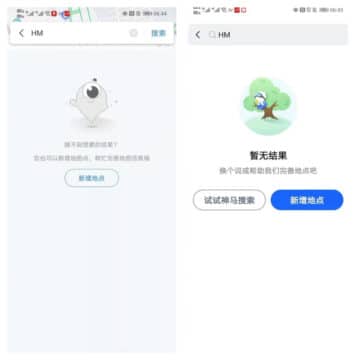
No H&M on these maps.
On Thursday, virtually all topics in Weibo’s top trending lists related to the Xinjiang cotton ban (see image below), with Chinese famous influencers and celebrities one by one announcing they would terminate their contracts with international brands related to the Xinjiang cotton ban.
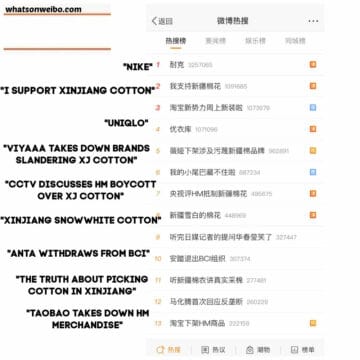
The storm became so big this week that some people on social media even commented that “if you’re a Chinese celebrity and you don’t have any contracts to terminate now, you’re not doing so well.”
After H&M, an entire list of brands was targeted, including Adidas, Nike, Calvin Klein, New Balance, Tommy Hilfiger, Uniqlo, Converse, Puma, Burberry, and Lacoste.
In light of the heated discussions and calls for boycotts, there was also another hashtag that popped up on Weibo, namely that of “don’t make it hard for the workers” (不要为难打工人). The hashtag came up after some Chinese staff members at Nike and Adidas stores were scolded on a live stream, with netizens calling on people to stay rational and not let the boycott turn into personal attacks on people. But another popular video showed a man in Chongqing calling customers out in an H&M store for buying their “trash.”
Another hashtag gaining many views, 520 million in total, was that of two ‘girls from Xinjiang dancing outside H&M’ (#新疆小姐姐在HM门店外跳新疆舞#) – it was linked to a video that showed two women performing outside of a H&M store in Chongqing.
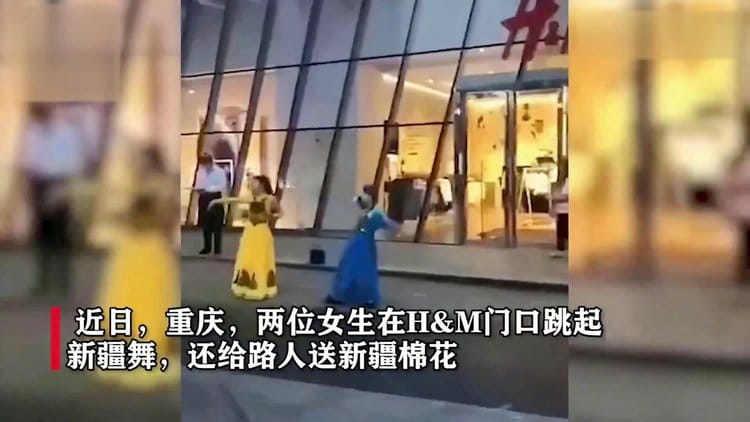
Meanwhile, some brands, including Chinese company Anta Sports and the Japanese Asics, reportedly announced they would leave the Better Cotton Initiative in order to continue sourcing cotton from Xinjiang.
The discussions on Xinjiang as Weibo saw this week are unprecedented, as ‘Xinjiang’ was previously a sensitive topic on Chinese social media and was barely discussed in political contexts. The last time Xinjiang became a big topic of discussion on Chinese social media was in 2018, when CCTV aired a program on the region’s “vocational education programs” in Xinjiang. That media moment triggered mixed reactions on Weibo, with some commenters wondering what the difference between a ‘re-education center’ and a ‘prison’ is.
Chinese State Media and the ‘Xinjiang Cotton Ban’
While Chinese netizens and celebrities play a major role in the storm that erupted over BCI, H&M, and Xinjiang cotton, the role of Chinese state media is pivotal.
Over the past week, various state media outlets posted strong messages regarding the ban in various ways, the most noteworthy one being People’s Daily‘s “I Support Xinjiang Cotton” (#我支持新疆棉花#) hashtag, which had garnered six billion views by the weekend. “The H&M Group released a statement that sparked outrage among netizens. Let’s pass it on together: Support Xinjiang Cotton,” the tagline of the hashtag page said.
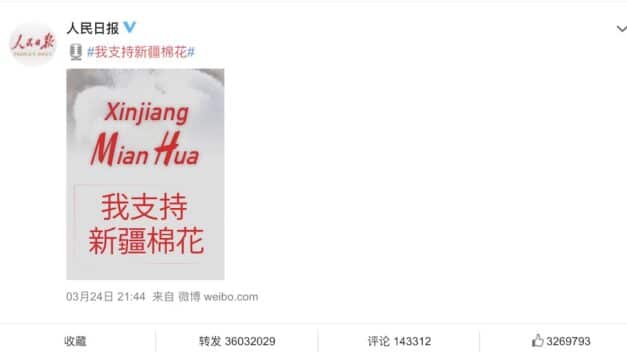
The message came with an image saying “Xinjiang Mianhua” (Xinjiang cotton) in a similar font to the H&M logo, the “H” and “M” within ‘mianhua‘ being identical to the H&M letters.
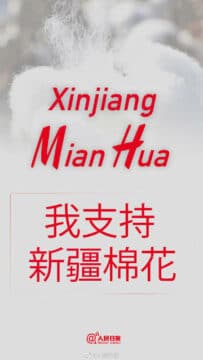
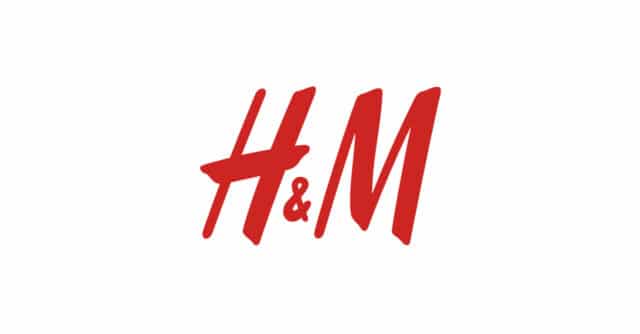
The image and post by People’s Daily was shared over 36 million times.
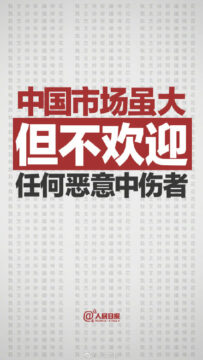
A message by People’s Daily: those who slander China are not welcome.
Another image by People’s Daily published on March 25 said that the Chinese market does not welcome those who slander China.
The Communist Youth League also contributed to the online storm by posting about H&M, writing: “On the one hand they are starting rumors and boycotting Xinjiang cotton, on the other hand they want to make money in China. Dream on, H&M!” That post received around 430,000 likes.
Various official media, including Global Times and China Daily, posted about cotton production in Xinjiang. Besides refuting the forced labor accusations and accusing Western players of hypocrisy and ulterior motives, a recurring issue stressed is how 42 percent of Xinjiang’s cotton is harvested by machines. Ministry of Commerce spokesman Gao Feng was quoted as saying that “the so-called forced labor in Xinjiang is nonexistent and entirely imaginary. The spotless white Xinjiang cotton brooks no slander.”
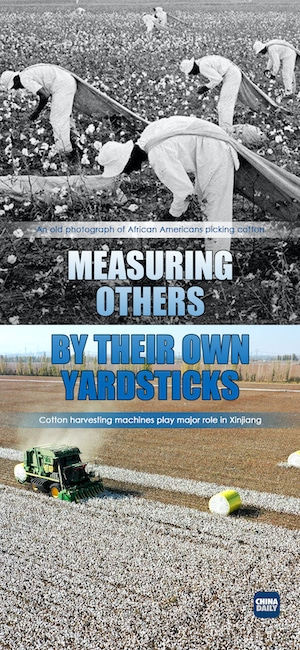
This image was posted by China Daily USA.
On March 27, People’s Daily posted a rap video by ‘Xinjiang Youth’ (新疆青年) on its official Weibo channel (video below) that included some tough lines attacking Western powers, companies, and media.
Chinese state media are now posting this rap song on social media about the “Western forces slandering Xinjiang cotton.” pic.twitter.com/piouahMf80
— Manya Koetse (@manyapan) March 27, 2021
Also noteworthy in this propaganda campaign is how the Canadian YouTuber Daniel Dumbrill got caught up, as what he said in one of his videos was quoted by Foreign Ministry spokesperson Hua Chunying (华春莹) on March 27 during a press conference, with his video being screened before the conference.
In this video, that was part of a larger panel on Xinjiang, Dumbrill responded to the decision-making process on how China’s treatment of Uyghurs is called a “genocide.”
Recently, a number of countries and parliaments including the U.S., Canada and the Netherlands have declared that China’s crackdown on the Muslim minorities amounts to “genocide” in violation of the U.N. Genocide Convention. Dumbrill talks about why the Xinjiang narratives matter to both the foreign and domestic politics of the US and other Western countries, with Dumbril claiming it “isn’t really about human rights and a care for overseas Muslims” but about other political goals. Dumbrill’s video was praised by authorities, state media, and by Chinese netizens.
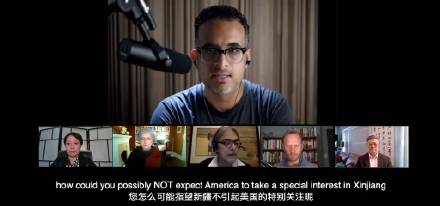
“We have to push for the truth to come out,” some netizens commented. Others wrote: “But we’re only allowed to discuss it from within [the country].”
Meanwhile, while many companies are seeing sales falling, there are also many who are benefiting from the current developments. Some sellers on Taobao have found another way to attract customers, promoting their products as being made with “100% Xinjiang Cotton!”
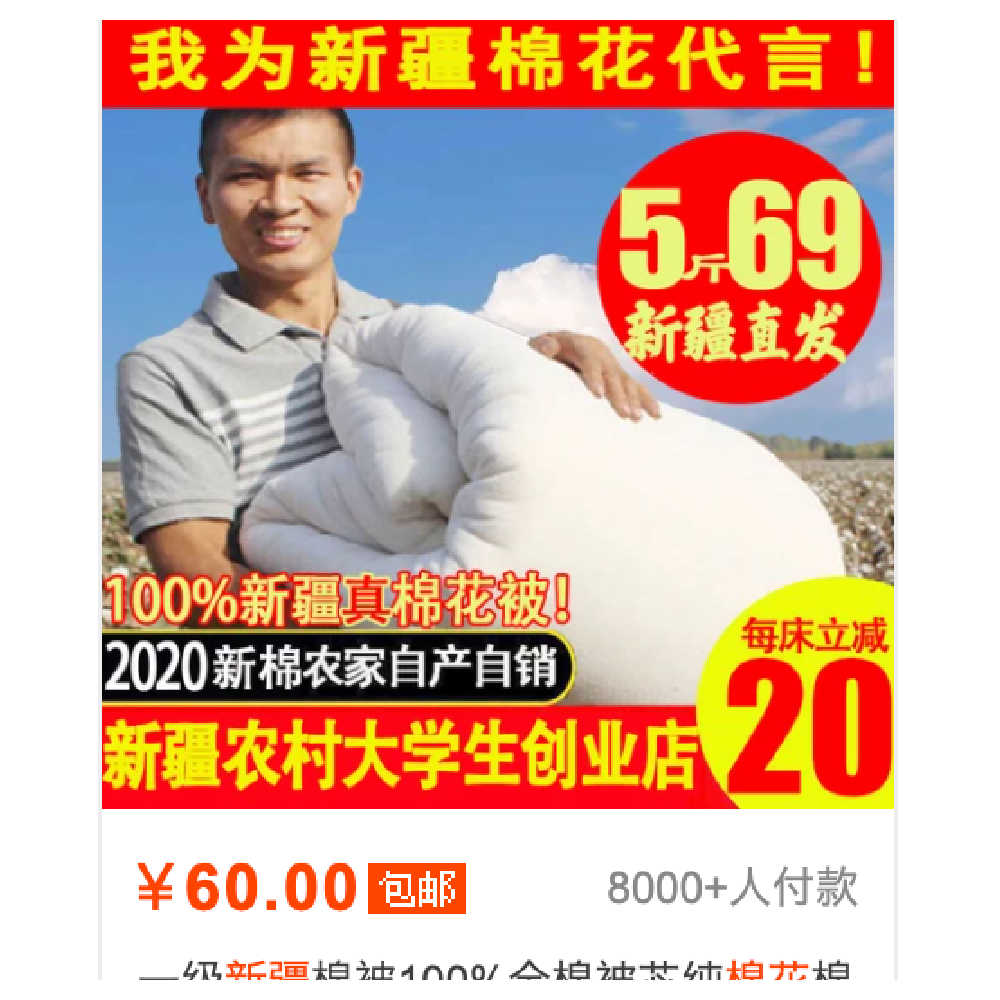
As this is an ongoing topic, we will report more later. Meanwhile, don’t forget to follow us on Twitter.
By Manya Koetse, with contributions by Miranda Barnes
Spotted a mistake or want to add something? Please let us know in comments below or email us. First-time commenters, please be patient – we will have to manually approve your comment before it appears.
©2021 Whatsonweibo. All rights reserved. Do not reproduce our content without permission – you can contact us at info@whatsonweibo.com.
Manya is the founder and editor-in-chief of What's on Weibo, offering independent analysis of social trends, online media, and digital culture in China for over a decade. Subscribe to gain access to content, including the Weibo Watch newsletter, which provides deeper insights into the China trends that matter. More about Manya at manyakoetse.com or follow on X.

China Arts & Entertainment
Controversial Wanghong Livestreamers Are Becoming a Weibo Staple in China
‘Wanghong’ was a mark of online fame; now, it’s increasingly tied to controversy and scandal.
Published
5 months agoon
October 27, 2024
As livestreaming continues to gain popularity in China, so do the controversies surrounding the industry. Negative headlines involving high-profile livestreamers, as well as aspiring influencers hoping to make it big, frequently dominate Weibo’s trending topics.
These headlines usually revolve around China’s so-called wǎnghóng (网红) influencers. Wanghong is a shortened form of the phrase “internet celebrity” (wǎngluò hóngrén 网络红人). The term doesn’t just refer to internet personalities but also captures the viral nature of their influence—describing content or trends that gain rapid online attention and spread widely across social media.
Recently, an incident sparked debate over China’s wanghong livestreamers, focusing on Xiaohuxing (@小虎行), a streamer with around 60,000 followers on Douyin, who primarily posts evaluations of civil aviation services in China.

Xiaohuxing (@小虎行)
On October 15, 2024, at Shenzhen Bao’an International Airport, Xiaohuxing confronted a volunteer at the automated check-in counter, insisting she remove her mask while livestreaming the entire encounter. He was heard demanding, “What gives you the right to wear a mask? What gives you the right not to take it off?” and even attempted to forcibly remove her mask, challenging her to call the police.

During the livestream, the livestreamer confronted the woman on the right for wearing a facemask.
He also argued with a male traveler who tried to intervene. In the end, the airport’s security officers detained him. Shortly after the incident, a video of the livestream went viral on Weibo under various hashtags (e.g. #网红小虎行机场强迫志愿者摘口罩#) and attracted millions of views. The following day, Xiaohuxing’s Douyin account was banned, and all his videos were removed. The Shenzhen Public Security Bureau later announced that the account’s owner, identified as Wang, had been placed in administrative detention.
On October 13, just days before, another livestreaming controversy erupted at Guangzhou Baiyun International Airport. Malatang (@麻辣烫), a popular Douyin streamer with over a million followers, secretly filmed a young couple kissing and mocked them, continuing to film while passing through security—an area where filming is prohibited.
Her livestream quickly went viral, sparking discussions about unauthorized filming and misconduct among Chinese wanghong. In response, Malatang’s agent posted an apology video. However, the affected couple hired a lawyer and reported the incident to the police (#被百万粉丝网红偷拍当事人发声#). On October 17, Malatang’s Douyin account was banned, and her videos were removed.

Livestreamer Malatang making fun of the couple in the back at the airport.
In both cases, netizens uncovered additional examples of inappropriate behavior by Xiaohuxing and Malatang in past broadcasts. For example, Xiaohuxing was reportedly aggressive towards a flight attendant, demanding she kneel to serve him, while Malatang was criticized for scolding a delivery person who declined to interact with her on camera.
Comments on Weibo included, “They’ll do anything for traffic. Wanghong are getting a bad reputation because of people like this.” Another added, “It seems as if ‘wanghong’ has become a negative term now.”
Rising Scrutiny in China’s Wanghong Economy
Xiaohuxing and Malatang are far from isolated cases. Recently, many other wanghong livestreamers have also been caught up in negative news.
One such figure is Dong Yuhui (董宇辉), a former English teacher at New Oriental (新东方) who transitioned to livestreaming for East Buy (东方甄选), where he mixed education with e-commerce (read here). Dong gained significant popularity and boosted East Buy’s brand before leaving to start his own company. Recently, however, Dong faced backlash for inaccurate statements about Marie Curie during an October 9 livestream. He incorrectly claimed that Curie discovered uranium, invented the X-ray machine, and won the Nobel Prize in Literature, among other things.
Considering his public image as a knowledgeable “teacher” livestreamer, this incident sparked skepticism among viewers about his actual expertise. A related hashtag (#董宇辉称居里夫人获得诺贝尔文学奖#) garnered over 81 million views on Weibo. In addition to this criticism, Dong is also being questioned about potential false advertising, which is a major challenge for all livestreamers selling products during their streams.
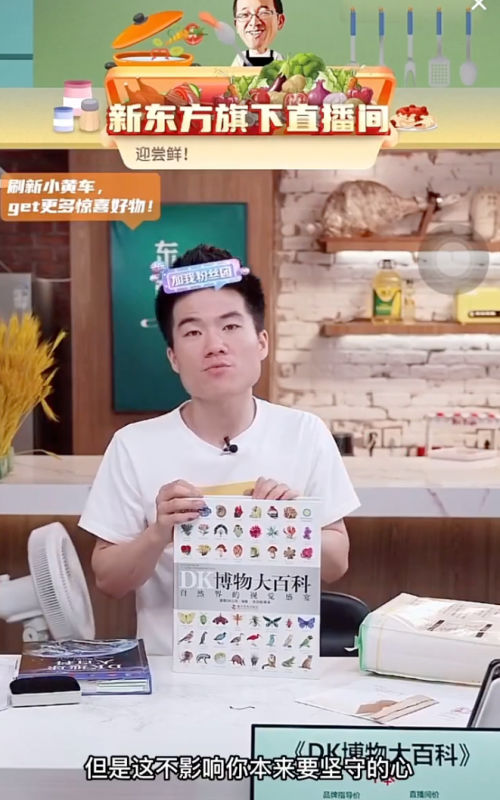
Dong Yuhui (董宇辉) during one of his livestreams.
Another popular livestreamer, Dongbei Yujie (@东北雨姐), is currently also facing criticism over product quality and false advertising claims. Originally from Northeast China, Dongbei Yujie shares content focused on rural life in the region. Recently, her Douyin account, which boasts an impressive 22 million followers, was muted due to concerns over the quality of products she promoted, such as sweet potato noodles (which reportedly contained no sweet potato). Despite issuing public apologies—which have garnered over 160 million views under the hashtag “Dongbei Yujie Apologizes” (#东北雨姐道歉#)—the controversy has impacted her account and led to a penalty of 1.65 million yuan (approximately 231,900 USD).

From Dongbei Yujie’s apology video
Former top Douyin livestreamer Fengkuang Xiaoyangge (@疯狂小杨哥) is also facing a career downturn. Leading up to the 2024 Mid-Autumn Festival, he promoted Hong Kong Meicheng mooncakes in his livestreams, branding them as a high-end Hong Kong product. However, it was soon revealed that these mooncakes had no retail presence in Hong Kong and were primarily produced in Guangzhou and Foshan, sparking accusations of deceptive marketing. Due to this incident and previous cases of misleading advertising, his company came under investigation and was penalized. In just a few weeks, Fengkuang Xiaoyangge lost over 8.5 million followers (#小杨哥掉粉超850万#).

Fengkuang Xiaoyangge (@疯狂小杨哥) and the mooncake controversy.
It’s not only ecommerce livestreamers who are getting caught up in scandal. Recently, the influencer “Xiaoxiao Nuli Shenghuo” (@小小努力生活) and her mother were arrested for fabricating a tragic story – including abandonment, adoption, and hardships – to gain sympathy from over one million followers and earn money through donations and sales. They, and two others who helped them manage their account, were sentenced to ten days in prison for ‘false advertising.’
Wanghong Fame: Opportunity and Risk
China’s so-called ‘wanghong economy’ has surged in recent years, with countless content creators emerging across platforms like Douyin, Kuaishou, and Taobao Live. These platforms have transformed interactions between content creators and viewers and changed how products are marketed and sold.
For many aspiring influencers, becoming a livestreamer is the first step to building a presence in the streaming world. It serves as a gateway to attracting traffic and potentially monetizing their online influence.
However, before achieving widespread fame, some livestreamers resort to using outrageous or even offensive content to capture attention, even if it leads to criticism. For example, before his account was banned, Xiaohuxing set his comment section to allow only followers to comment, gaining 3,000 new followers after his controversial livestream at Shenzhen Airport went viral. Many speculated that some followers joined just to leave critical comments, but it nonetheless grew his following.
As livestreamers gain significant fame, they must exercise greater caution, as they often hold substantial influence over their audiences, making accuracy essential. Mistakes, whether intentional or not, can quickly erode trust, as seen in the example of the super popular Dong Yuhui, who faced backlash after his inaccurate comment about Marie Curie sparked public criticism.
China’s top makeup livestreamer, Li Jiaqi (李佳琦), experienced a similar reputational crisis in September last year. Responding dismissively to a viewer who commented on the high price of an eyebrow pencil, Li replied, “Have you received a raise after all these years? Have you worked hard enough?” Commentators pointed out that the pencil’s cost per gram was double that of gold at the time. Accused of “forgetting his roots” as a former humble salesman, Li lost one million Weibo followers in a day (read more here).
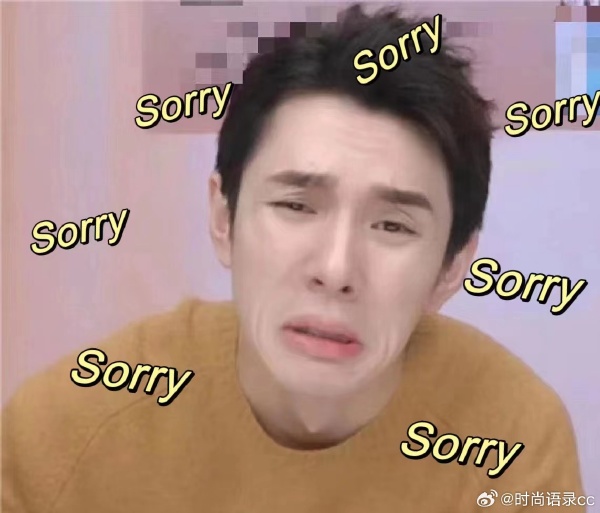
This meme shows that many viewers did not feel moved by Li’s apologetic tears after the eyepencil incident.
Despite the challenges and risks, becoming a wanghong remains an attractive career path for many. A mid-2023 Weibo survey on “Contemporary Employment Trends” showed that 61.6% of nearly 10,000 recent graduates were open to emerging professions like livestreaming, while 38.4% preferred more traditional career paths.
Taming the Wanghong Economy
In response to the increasing number of controversies and scandals brought by some wanghong livestreamers, Chinese authorities are implementing stricter regulations to monitor the livestreaming industry.
In 2021, China’s Propaganda Department and other authorities began emphasizing the societal influence of online influencers as role models. That year, the China Association of Performing Arts introduced the “Management Measures for the Warning and Return of Online Hosts” (网络主播警示与复出管理办法), which makes it challenging, if not impossible, for “canceled” celebrities to stage a comeback as livestreamers (read more).
The Regulation on the Implementation of the Law of the People’s Republic of China on the Protection of Consumer Rights and Interests (中华人民共和国消费者权益保护法实施条例), effective July 1, 2024, imposes stricter rules on livestream sales. It requires livestreams to disclose both the promoter and the product owner and mandates platforms to protect consumer rights. In cases of illegal activity, the platform, livestreaming room, and host are all held accountable. Violations may result in warnings, confiscation of illegal earnings, fines, business suspensions, or even the revocation of business licenses.
These regulations have created a more controlled “wanghong” economy, a marked shift from the earlier, more unregulated era of livestreaming. While some view these measures as restrictive, many commenters support the tighter oversight.
A well-known Kuaishou influencer, who collaborates with a person with dwarfism, recently faced backlash for sharing “vulgar content,” including videos where he kicks his collaborator (see video) or stages sensational scenes just for attention.
Most commenters welcome the recent wave of criticism and actions taken against such influencers, including Xiaohuxing and Dongbei Yujie, for their behavior. “It’s easy to become famous and make money like this,” commenters noted, adding, “It’s good to see the industry getting cleaned up.”
State media outlet People’s Daily echoed this sentiment in an October 21 commentary, stating, “No matter how many fans you have or how high your traffic is, legal lines must not be crossed. Those who cross the red line will ultimately pay the price.”
This article and recent incidents have sparked more online discussions about the kind of influencers needed in the livestreaming era. Many suggest that, beyond adhering to legal boundaries, celebrity livestreamers should demonstrate a higher moral standard and responsibility within this digital landscape. “We need positive energy, we need people who are authentic,” one Weibo user wrote.
Others, however, believe misbehaving “wanghong” livestreamers naturally face consequences: “They rise fast, but their popularity fades just as quickly.”
When asked, “What kind of influencers do we need?” one commenter responded, “We don’t need influencers at all.”
By Wendy Huang
Follow @whatsonweibo
Edited for clarity by Manya Koetse
Spotted a mistake or want to add something? Please let us know in comments below or email us. Please note that your comment below will need to be manually approved if you’re a first-time poster here.
©2024 Whatsonweibo. All rights reserved. Do not reproduce our content without permission – you can contact us at info@whatsonweibo.com
China Books & Literature
Why Chinese Publishers Are Boycotting the 618 Shopping Festival
Bookworms love to get a good deal on books, but when the deals are too good, it can actually harm the publishing industry.
Published
10 months agoon
June 8, 2024By
Ruixin Zhang
JD.com’s 618 shopping festival is driving down book prices to such an extent that it has prompted a boycott by Chinese publishers, who are concerned about the financial sustainability of their industry.
When June begins, promotional campaigns for China’s 618 Online Shopping Festival suddenly appear everywhere—it’s hard to ignore.
The 618 Festival is a product of China’s booming e-commerce culture. Taking place annually on June 18th, it is China’s largest mid-year shopping carnival. While Alibaba’s “Singles’ Day” shopping festival has been taking place on November 11th since 2009, the 618 Festival was launched by another Chinese e-commerce giant, JD.com (京东), to celebrate the company’s anniversary, boost its sales, and increase its brand value.
By now, other e-commerce platforms such as Taobao and Pinduoduo have joined the 618 Festival, and it has turned into another major nationwide shopping spree event.
For many book lovers in China, 618 has become the perfect opportunity to stock up on books. In previous years, e-commerce platforms like JD.com and Dangdang (当当) would roll out tempting offers during the festival, such as “300 RMB ($41) off for every 500 RMB ($69) spent” or “50 RMB ($7) off for every 100 RMB ($13.8) spent.”
Starting in May, about a month before 618, the largest bookworm community group on the Douban platform, nicknamed “Buying Like Landsliding, Reading Like Silk Spinning” (买书如山倒,看书如抽丝), would start buzzing with activity, discussing book sales, comparing shopping lists, or sharing views about different issues.

Social media users share lists of which books to buy during the 618 shopping festivities.
This year, however, the mood within the group was different. Many members posted that before the 618 season began, books from various publishers were suddenly taken down from e-commerce platforms, disappearing from their online shopping carts. This unusual occurrence sparked discussions among book lovers, with speculations arising about a potential conflict between Chinese publishers and e-commerce platforms.
A joint statement posted in May provided clarity. According to Chinese media outlet The Paper (@澎湃新闻), eight publishers in Beijing and the Shanghai Publishing and Distribution Association, which represent 46 publishing units in Shanghai, issued a statement indicating they refuse to participate in this year’s 618 promotional campaign as proposed by JD.com.
The collective industry boycott has a clear motivation: during JD’s 618 promotional campaign, which offers all books at steep discounts (e.g., 60-70% off) for eight days, publishers lose money on each book sold. Meanwhile, JD.com continues to profit by forcing publishers to sell books at significantly reduced prices (e.g., 80% off). For many publishers, it is simply not sustainable to sell books at 20% of the original price.
One person who has openly spoken out against JD.com’s practices is Shen Haobo (沈浩波), founder and CEO of Chinese book publisher Motie Group (磨铁集团). Shen shared a post on WeChat Moments on May 31st, stating that Motie has completely stopped shipping to JD.com as it opposes the company’s low-price promotions. Shen said it felt like JD.com is “repeatedly rubbing our faces into the ground.”
Nevertheless, many netizens expressed confusion over the situation. Under the hashtag topic “Multiple Publishers Are Boycotting the 618 Book Promotions” (#多家出版社抵制618图书大促#), people complained about the relatively high cost of physical books.
With a single legitimate copy often costing 50-60 RMB ($7-$8.3), and children’s books often costing much more, many Chinese readers can only afford to buy books during big sales. They question the justification for these rising prices, as books used to be much more affordable.
Book blogger TaoLangGe (@陶朗歌) argues that for ordinary readers in China, the removal of discounted books is not good news. As consumers, most people are not concerned with the “life and death of the publishing industry” and naturally prefer cheaper books.
However, industry insiders argue that a “price war” on books may not truly benefit buyers in the end, as it is actually driving up the prices as a forced response to the frequent discount promotions by e-commerce platforms.
China News (@中国新闻网) interviewed publisher San Shi (三石), who noted that people’s expectations of book prices can be easily influenced by promotional activities, leading to a subconscious belief that purchasing books at such low prices is normal. Publishers, therefore, feel compelled to reduce costs and adopt price competition to attract buyers. However, the space for cost reduction in paper and printing is limited.
Eventually, this pressure could affect the quality and layout of books, including their binding, design, and editing. In the long run, if a vicious cycle develops, it would be detrimental to the production and publication of high-quality books, ultimately disappointing book lovers who will struggle to find the books they want, in the format they prefer.
This debate temporarily resolved with JD.com’s compromise. According to The Paper, JD.com has started to abandon its previous strategy of offering extreme discounts across all book categories. Publishers now have a certain degree of autonomy, able to decide the types of books and discount rates for platform promotions.
While most previously delisted books have returned for sale, JD.com’s silence on their official social media channels leaves people worried about the future of China’s publishing industry in an era dominated by e-commerce platforms, especially at a time when online shops and livestreamers keep competing over who has the best book deals, hyping up promotional campaigns like ‘9.9 RMB ($1.4) per book with free shipping’ to ‘1 RMB ($0.15) books.’
This year’s developments surrounding the publishing industry and 618 has led to some discussions that have created more awareness among Chinese consumers about the true price of books. “I was planning to bulk buy books this year,” one commenter wrote: “But then I looked at my bookshelf and saw that some of last year’s books haven’t even been unwrapped yet.”
Another commenter wrote: “Although I’m just an ordinary reader, I still feel very sad about this situation. It’s reasonable to say that lower prices are good for readers, but what I see is an unfavorable outlook for publishers and the book market. If this continues, no one will want to work in this industry, and for readers who do not like e-books and only prefer physical books, this is definitely not a good thing at all!”
By Ruixin Zhang, edited with further input by Manya Koetse
Independently reporting China trends for over a decade. Like what we do? Support us and get the story behind the hashtag by subscribing:
Spotted a mistake or want to add something? Please let us know in comments below or email us. First-time commenters, please be patient – we will have to manually approve your comment before it appears.
©2024 Whatsonweibo. All rights reserved. Do not reproduce our content without permission – you can contact us at info@whatsonweibo.com.
Subscribe

Strange Encounter During IShowSpeed’s Chengdu Livestream

IShowSpeed in China: Streaming China’s Stories Well

How K-pop Fans and the 13-Year-Old Daughter of Baidu VP Sparked a Debate on Online Privacy

Squat or Sit? China’s Great Toilet Debate and the Problem of Footprints on the Seat

Weibo Watch: The Great Squat vs Sitting Toilet Debate in China🧻

Our Picks: Top 10 Chinese Buzzwords and Phrases of 2024 Explained

“Dear Li Hua”: The TikTok/Xiaohongshu Honeymoon Explained

Beyond the Box Office: What’s Behind Ne Zha 2’s Success?

Weibo Watch: Christmas in China Is Everywhere and Nowhere

Weibo Watch: A New Chapter

15 Years of Weibo: The Evolution of China’s Social Media Giant

Tuning Into the Year of the Snake

The ‘China-chic Girl’ Image and the Realities of China’s Competitive Food Delivery Market

TikTok Refugees, Xiaohongshu, and the Letters from Li Hua

“Black Myth: Wukong”: From Gaming Screens to the CMG Spring Festival Gala?
Get in touch
Would you like to become a contributor, or do you have any tips or suggestions? Get in touch here!
Popular Reads
-

 China Insight11 months ago
China Insight11 months agoThe Tragic Story of “Fat Cat”: How a Chinese Gamer’s Suicide Went Viral
-

 China Digital10 months ago
China Digital10 months agoChina’s 2024 Gaokao Triggers Online Discussions on AI
-

 China Arts & Entertainment11 months ago
China Arts & Entertainment11 months agoSinging Competition or Patriotic Fight? Hunan TV’s ‘Singer 2024’ Stirs Nationalistic Sentiments
-

 China Arts & Entertainment12 months ago
China Arts & Entertainment12 months ago“Old Bull Eating Young Grass”: 86-Year-Old Chinese Painter Fan Zeng Marries 36-Year-Old Xu Meng







Michael Gordon
April 8, 2021 at 5:39 pm
we support the Xinjiang people!